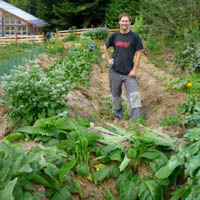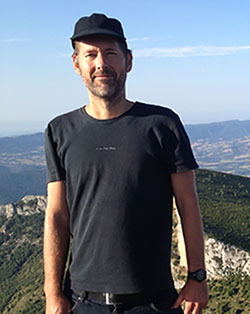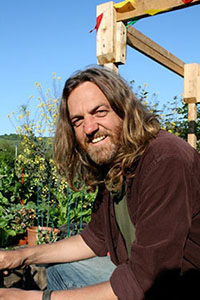


|
Joined:
|
30/07/2012 |
|---|---|
|
Last Updated:
|
28/10/2013 |
|
Location:
|
Catalunya, Barcelona, Spain |
|
Climate Zone:
|
Mediterranean |
|
Gender:
|
Male |
|
Web site:
|
www.12pdesign.net |
(projects i'm involved in)
Back to Alfred Decker's profile
Posted by Alfred Decker almost 11 years ago
http://www.ecodharma.com/courses-events/2014/07/05/permaculture-design-course
Permaculture offers practical skills and methods for designing and creating sustainable living systems, integrating human needs with the ecosystems in which we are rooted. It is a theory of ecological design which seeks to develop sustainable human settlements and agricultural systems, by modelling them on the diversity, stability and resilience of natural ecosystems.
The Permaculture Design Course (PDC) is a 72-hour certified and holistic course encompassing a wide range of topics that demonstrate how to work with our ecological and social environment. The PDC will be composed of lectures, discussions, practical activities, and design exercises. Participants will gain knowledge and skills to enable them to design and implement the principles of permaculture in the creation of truly sustainable systems that can enable us to live well and with respect for each other and the earth.
The term “permaculture” was originally coined to refer to the idea of a truly sustainable agriculture, but has expanded to embrace the idea of “permanent culture” in recognition that the social dimension is integral to truly sustainable living systems. It has been described as “a philosophy of working with, rather than against nature; of protracted and thoughtful observation rather than protracted and thoughtless labour; and of looking at plants and animals in all their functions, rather than treating any area or thing in isolation.”
 Permaculture
draws from several disciplines including organic farming,
agro-forestry, sustainable development, and applied ecology. The design
principles which are the conceptual foundation of permaculture are
derived from the science of systems ecology and study of pre-industrial
examples of sustainable land use. The primary agenda of the movement has
been to assist people to become more self reliant through the design
and development of productive and sustainable gardens and farms. It
applies equally well to both rural and urban areas. Permaculture can
also be called simply, “a revolution disguised as gardening.”
Permaculture
draws from several disciplines including organic farming,
agro-forestry, sustainable development, and applied ecology. The design
principles which are the conceptual foundation of permaculture are
derived from the science of systems ecology and study of pre-industrial
examples of sustainable land use. The primary agenda of the movement has
been to assist people to become more self reliant through the design
and development of productive and sustainable gardens and farms. It
applies equally well to both rural and urban areas. Permaculture can
also be called simply, “a revolution disguised as gardening.”
Back in the 70’s, two Australians, Bill Mollison and David Holmgren started a journey that we are still on today. They re-organized ancient knowledge and skills, traditional wisdom about plants, animals, and social systems, and added some new ideas. They effectively created a system of design for how to build a stable and resilient culture, and called it “permaculture.
The majority of sciences, including modern agriculture and horticulture, have been developed under a reductionist approach, separating everything — soils, plants, insects, animals and humans — and examining in great detail every one of these isolated elements. In contrast Permaculture is the study of inter-relations and the inter-dependence of living organisms in their environment. It results in a new way of sustaining and enriching life without social and environmental degradation. Permaculture design focuses on connections between things, creating something bigger than its parts.
Permaculture is underpinned by a set of three ethics, and by principles which are transmitted in various ways and interwoven throughout the ethics:
CARE OF THE EARTH: Provision for all life systems to continue and multiply.
CARE OF THE PEOPLE: Provision for people to access those resources necessary for their existence.
FAIR SHARE: By governing our own needs, we can set aside resources to further the above ethics.
Permaculture ethics offer a direction to responsibilities, moral values and livelihood. They provide the vision on which design approaches and strategies can be tested.
What are the learning outcomes? Participants will learn:
• approaches to design including: mapping; designing from patterns to
details; analysis of elements; using slope & orientation; and
analysing the needs and yields of systems.
• how to increase productivity using intensive garden design strategies
including: stacking, soil-building, mulch, nutrient cycling, pest
control, green manures, worms, compost & companion planting.
• how to survey landscapes for property design using simple and
sophisticated tools; mapping and map making; and site analysis and
assessment.
• how to read weather patterns; create and enhance micro-climates; and
create design strategies for all major global climatic zones.
• how trees and forests regulate and moderate ecosystems; how to
sustainably use, propagate, harvest and manage tree systems using
techniques such as coppicing, pollarding, grafting, shelter belts,
orchards, guild planting and succession planning.
• how to save money on energy bills with efficient home design, retrofitting, and renewable energy systems.
• multiple uses for greywater; constructed wetland design; and other techniques for treating “waste water.
• passive water hydration and infiltration, rainwater collection, storage and composting toilets.
• using reconstructive earthworks, water harvesting and soil
conditioning to recharge ground water, re-hydrate and drought-proof the
landscape.
• how to bring fertility back to the land and build topsoil through a diversity of ancient and modern techniques.
• how to cycle nutrients and incorporate animals into your system using
innovative techniques such as chicken tractors, pannage systems, pigeon
lofts, dairy systems and beekeeping.
• creating living ecosystems that feed and nurture us and future
generations. Design through the use of nature’s rules to create a lush
and resilient natural environment.
• aquaponic systems, the combination of aquaculture (growing fish) and hydroponics (growing food without soil).
• how to design solar-heated buildings (including cold-climate
greenhouses). The use of natural building materials, energy efficient
house placement and design and the assurance of a healthy indoor
environment.
• strategies for creating community-wide sustainability, village
development, alternative economies, local currencies, and how to
organize community groups.
What is the schedule?
DAY ONE: • Ethics & Principles • Design Methods
DAY TWO: • Map Reading • Water & Soils
DAY THREE: • Macro & Micro Climates • Earthworks
DAY FOUR: • Plants & Forests • Windbreaks
DAY FIVE: • Patterns in Nature
• Our houses and gardens
DAY SIX: • Fruit Tree Forest
• Field Crops and Animals
DAY SEVEN: • Day of Rest
DAY EIGHT: • Natural Forests and Wildlife Management • Site Analysis
• Weed Ecology
DAY NINE: • Design for Disaster • Biotechnology
DAY TEN: • Bio-regions – Local Wealth • Ethical Investment
DAY ELEVEN: • Land Ethics & Access
• Village and Commune Permaculture • Suburban Permaculture
• Urban Permaculture
DAY TWELVE: • Design Work
• Design Presentations • Celebration!
Suggested contribution in the Dana Economy is between €450 and €800. Make a booking.
The team:
Alfred Decker, Caspar Brown, Grace McKeown.
 Alfred Decker:
Alfred’s passion in life has been environmental and social justice
activism, of which permaculture has played a central part. Since his
first PDC in 1997 in California, Alfred has
been involved with social movements and projects throughout Europe and
the Americas. Having chosen to put down roots in Barcelona, he is
currently working on a master’s degree in sustainable architecture and
renewable energy (Centre for Alternative Technology); initiated a new
local group, Permacultura Barcelona (www.permacultura-bcn.org); and is
organising a forest gardens project at Can Masdeu (www.canmasdeu.net).
Alfred Decker:
Alfred’s passion in life has been environmental and social justice
activism, of which permaculture has played a central part. Since his
first PDC in 1997 in California, Alfred has
been involved with social movements and projects throughout Europe and
the Americas. Having chosen to put down roots in Barcelona, he is
currently working on a master’s degree in sustainable architecture and
renewable energy (Centre for Alternative Technology); initiated a new
local group, Permacultura Barcelona (www.permacultura-bcn.org); and is
organising a forest gardens project at Can Masdeu (www.canmasdeu.net).
He is a member of the European Permaculture Council
(www.permaculturecouncil.eu) and the European Permaculture Teachers
Partnership (www.permateachers.eu). After taking a Permaculture
Teachers' Training Course with Rosemary Morrow in 2011, he undertook a
two year mentorship and later co-taught five courses with Rosemary,
ultimately earning a diploma in Permaculture Education & Community
Development in 2013 through her organisation Blue Mountains Permaculture
Institute – Australia. Alfred has taught in the U.S., Italy, France,
Germany, Portugal, Greece, Catalunya and the Spanish Territory,
including two “Permaculture and Deep Ecology” courses at Ecodharma.
 Caspar Brown
teaches bushcraft, nature awareness, permaculture and mentoring in the
UK and other parts of Europe. He has trained with various Wilderness
schools including Trackways. Woodsmoke and Jon Young’s “The art of
mentoring” program. He is a keen observationists and very interested in
learning and teaching more about the relationship that humans have with
their land base and see this as key in becoming an effective
Permaculturist. He co-runs “Open Earth Ecology” where Radical
permaculture techniques are encouraged and employed. He is also a
talented musician and storyteller.
Caspar Brown
teaches bushcraft, nature awareness, permaculture and mentoring in the
UK and other parts of Europe. He has trained with various Wilderness
schools including Trackways. Woodsmoke and Jon Young’s “The art of
mentoring” program. He is a keen observationists and very interested in
learning and teaching more about the relationship that humans have with
their land base and see this as key in becoming an effective
Permaculturist. He co-runs “Open Earth Ecology” where Radical
permaculture techniques are encouraged and employed. He is also a
talented musician and storyteller.
 Grace McKeown
has a long and close involvement in the ecodharma project, where she
has provided continuity and experience to the development of growing and
cultivating. She played a lead role in the design and implementation of
the forest garden in 2012/3 and continues to help coordinate planning
for land use. She has a special sensitivity concerning the preservation
of the wild land in the valley. With decades of experience teaching and
practicing integrative medicine and holistic health, this currently
feeds into her interests in the therapeutic dimensions of growing and
food production, as well as the medicinal value of plants, both
cultivated and foraged in the wild.
Grace McKeown
has a long and close involvement in the ecodharma project, where she
has provided continuity and experience to the development of growing and
cultivating. She played a lead role in the design and implementation of
the forest garden in 2012/3 and continues to help coordinate planning
for land use. She has a special sensitivity concerning the preservation
of the wild land in the valley. With decades of experience teaching and
practicing integrative medicine and holistic health, this currently
feeds into her interests in the therapeutic dimensions of growing and
food production, as well as the medicinal value of plants, both
cultivated and foraged in the wild.
You must be logged in to comment.

| Permaculture Design Certificate (PDC) course |
| Type: Permaculture Design Certificate (PDC) course |
| Verifying teacher: Penny Livingston-Stark |
| Other Teachers: Brock Dolman |
| Location: Occidental Arts & Ecology Center, California |
| Date: Feb 1998 |

| Permaculture Teacher's Training |
| Type: Teacher Training |
| Teacher: Rowe Morrow |
| Location: Stainz, Austria |
| Date: Jul 2011 |

| Permaculture Teacher's Training |
| Type: Teacher Training |
| Teacher: Rowe Morrow |
| Location: Vale de Lama, Portugal |
| Date: Apr 2012 |

| Diploma: Education & Community Development |
| Type: Permaculture Diploma |
| Teacher: Rosemary Morrow |
| Location: Blue Mountains Permaculture Institute |
| Date: Jul 2011 |
| 7 PDC Graduates (list) |
| 0 PRI PDC Graduates (list) |
| 16 Other Course Graduates (list) |
| have acknowledged being taught by Alfred Decker |
| 0 have not yet been verified (list) |
| Alfred Decker has permaculture experience in: |
|---|
| Cool Temperate |
| Mediterranean |
| Semi Arid |